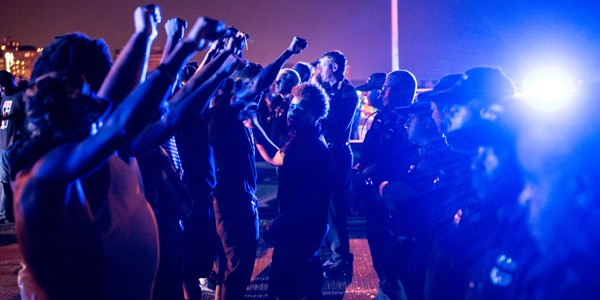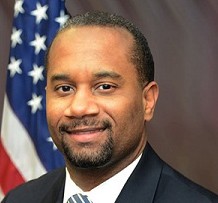 Brandon Dill
Brandon Dill
Protesters and police officers face off during the 2016 Hernando de Soto bridge protest
The head of the team appointed by the court to monitor the Memphis Police Department’s (MPD) adherence to a federal judge’s October ruling on police surveillance said at a Tuesday hearing that the city has been “cooperative” and “responsive” so far.
U.S. District Judge Jon McCalla appointed former U.S. Attorney Ed Stanton of the Butler Snow Law Firm to lead the independent monitoring group in December after he ruled in the American Civil Liberties Union (ACLU) of Tennessee v. the city of Memphis case. McCalla said the city failed to train its officers on the 1978 consent decree that bars political surveillance of citizens and that MPD did violate that decree.
As a result, the court imposed sanctions on the police department, including the appointment of Stanton and several others to monitor the implementation of the court’s recommendations.
The court instructed the department to revise its policies on political intelligence and train officers accordingly, establish a process for approving criminal investigations that may incidentally result in gathering political intelligence, establish written guidelines for the use of social media searches, and maintain a list of those searches.

Ed Stanton III
Giving a progress report to the court, Stanton said Tuesday that over the past three and a half months, the team has been acting as the “eyes and ears of the court,” conducting a comprehensive review of MPD’s code of conduct, it’s onboarding and training process, and social media practices, including a record of the search terms used by the department.
“It’s important to know that to date, the city, through its counsel, has been extremely cooperative, responsive, and resourceful in providing the documents and files the monitoring team has requested thus far,” Stanton said. “Still, it’s impossible to obtain instant solutions or compliance.”
Stanton said the team is still evaluating data and thousands of documents from the city.
Another important part of the process will be meeting with Lt. Col. Anthony Rudolph, training commander for MPD, to learn more about the training officers receive relating to social media and surveillance.
Stanton said the team was hoping to meet with Rudolph before Tuesday’s hearing, but wasn’t able to as Rudolph is out of the country.
Judge McCalla said meeting with Rudolph is crucial to the process, calling the parties’ inability to set a meeting with the commander a “miscue” that should not have occurred: “This should have happened a while ago.”
Another member of the monitoring team, Jim Letten, a former U.S. Attorney, said once Rudolph returns, the team will assess MPD’s current policies and training program, adjusting or adding to it if necessary. The aim is to “preserve the department’s investigative goals” while “preserving the right to express and enjoy the First Amendment.”
[pullquote-2]
To do this, the department has to put a training program in place that will “reach every single officer in the department,” training them to “recognize and protect First Amendment rights,” Letten said.
The final recommendations the team makes to the court won’t “threaten degrading the police department’s ability to effectively investigate, find offenders, and protect citizens,” but it won’t “offend the consent decree,” Letten said.
Rachel Levinson-Walden of the Brennan Center for Justice in New York, also serving on the monitoring team, said MPD has made “significant efforts” to address the concerns raised by the team.
Levinson-Walden said this has been “a major factor” in the team’s ability to accommodate the court’s requests.
“The city has made significant progress already and has been extremely cooperative, but there’s more to be done in terms of training and putting protocols in place and in terms of embracing the values set out by this court,” Levinson-Walden said. “Where we are seeing the policies headed are by-and-large in a very good direction.”
But Levinson-Walden reminded the court of why everyone was there Tuesday in the first place: ”In general, social media surveillance by law enforcement can be intimidating and chilling, especially when the focus is people exercising their constitutional right or when it’s disproportionately focused on communities of color.”
Citing a set of police guidelines relating to the use of social media for intelligence drafted by the U.S. Department of Justice’s Bureau of Justice Assistance in 2013, Levinson-Walden highlighted the need for oversight mechanisms to make sure the department is adhering to the consent decree.
The 2013 guidelines recommend that any law enforcement action involving undercover activity, including developing an undercover profile on social media, should require documentation of all activity, periodic reviews, and auditing of the undercover processes.
Levinson-Walden also said that if a police department is using social media for investigative purposes, then its social media policies should be available to the public.
[pullquote-1]
This isn’t an area that has gotten much attention on a national level, she said. But she and others are in the process of drafting legislation that would put transparency and accountability mechanisms in place for law enforcement agencies using social media.
Levinson-Walden found through a survey that of the 156 police departments in the country who have purchased social media monitoring software, only 18 of them have information-gathering policies that are available to the public.
A major focus of the legislation would be to make sure the public understands how law enforcement is using social media and have an opportunity to provide input on that process.
The bill would also provide certain protections for juveniles, put restrictions on undercover accounts, and require a yearly report from departments on how they are using social media.
Judge McCalla told the monitoring team, along with attorneys for the city and the ACLU that he would like to have all proposed policy revisions drafted within 90 days.